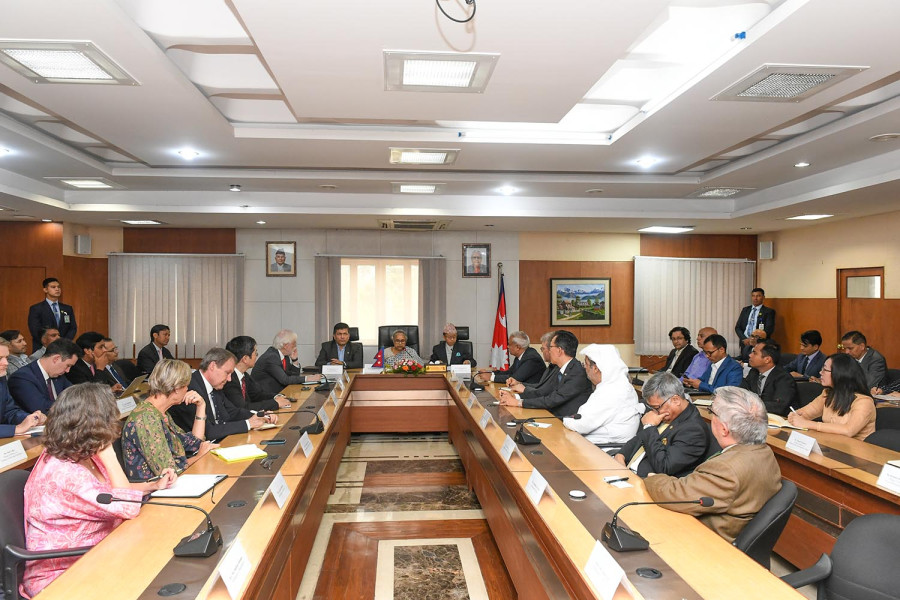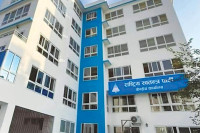Politics
PM promises smooth transition to elected government
Tells diplomats the government’s focus is on credible elections, anti-corruption reforms, and economic recovery.
Anil Giri
Prime Minister Sushila Karki said on Friday that the government is committed to serving a maximum six-month term, after which she will peacefully hand over power to a democratically elected government.
In her first briefing to Kathmandu-based diplomats since the formation of the interim government last month, Karki, who also oversees the foreign ministry, said that her government is a non-political, transitional administration with a single, non-negotiable mandate to hold free, fair, and impartial general elections to the House of Representatives on March 5, 2026.
The interim government was installed following a nationwide anti-corruption movement on September 8 and 9 that left over 70 people, mostly young students, dead. The unrest led to the ouster of the KP Sharma Oli-led coalition government and the dissolution of the House of Representatives.
She told the diplomats about Nepal’s path to transparent governance, preparations for the elections on March 5, economic recovery, and engaging Nepal's younger generation in the democratic process among others.
“We are not here to pursue a political agenda, but to pave the way for a new, legitimate one. Our priority is internal stability, and we will serve as a neutral buffer that guarantees a predictable and secure environment for the democratic process.”
Stressing the importance of elections, Karki said that the government's entire focus and resources are being directed towards creating the necessary conditions—security, legal frameworks, and logistical preparation—for a credible election.
“We are empowering the Election Commission, improving security, and holding dialogues with all political parties and stakeholders, including the Gen-Z representatives,” said Karki. "We are also exploring the possibility of an external voting system to progressively realise the principle of universal suffrage for Nepali nationals temporarily living abroad.”
As in previous elections, she added, international observation will continue to play an important role in upholding the transparency and credibility of this historic democratic exercise. “We deeply appreciate your continued goodwill and support in this journey.”
Though she briefed the diplomatic community on election preparations, she did not seek support from them.
The event was organised to inform the Kathmandu-based diplomats about the priorities of the new government formed in the wake of the Gen Z movement.
In her briefing, she outlined steps and initiatives being taken by the government, including revisions to the national budget to promote transparency, close avenues for misuse of public funds, and opened files to prosecute entrenched corruption. She said the government has also launched a series of policy reforms to boost the private sector, recognising it as the key engine of economic growth and job creation.
“These steps are just the beginning,” she said. “The economic and political reforms are not just the demands of Gen Z, but also the aspirations of every Nepali citizen.”
On foreign policy, she said Nepal continues to be guided by the United Nations charter, non-alignment, the principles of Panchsheel, international law, and norms of world peace.
“While focusing on elections, we must also manage the immediate post-crisis economic recovery,” said Karki. “We appreciate international support to restore business confidence, address the consequences of infrastructure damage, and ensure the basic functioning of essential public services until the new government takes office.”
“The reconstruction and rehabilitation of infrastructure damaged during the movement are urgent. We have established a Physical Infrastructure Reconstruction Fund. Furthermore, the devastating monsoon floods and landslides this month show Nepal’s growing vulnerability to climate change. We certainly appreciate support from our development partners in these areas.”
Prime Minister Karki said the government is also working to urgently retrieve arms and equipment lost or stolen during the September 8-9 protests.
“The recent unrest and subsequent global attention have created immediate economic pressures, particularly impacting vital remittance flows due to tightened visa regulations in some destination countries,” said Karki, adding, that the government looks forward to continued diplomatic engagements to ease the pressures, enhance labour diplomacy, and safeguard Nepali migrant workers’ livelihoods while ensuring the country’s economic stability.
She said Nepal stands at a critical juncture as it prepares to graduate from LDC status next year and is determined to make the transition smooth and sustainable.
“The situation in Nepal is gradually returning to normalcy, a testament to the resilience of our people. We would greatly appreciate your support in sharing this positive message with the wider international community.”
The Gen Z movement emerged as a powerful reminder of our collective responsibility to listen, respond, reform and deliver,” said Karki, adding, “It also reflects people’s profound aspiration for good governance, economic opportunity and integrity in public life.”
“While our achievements since the adoption of the new constitution are modest, this movement has warned us that there is no room for complacency. We must rededicate ourselves to deliver to our people for their legitimate aspirations. Since the formation of this government just last month, we have uncovered not only the massive challenges of corruption and misrules in our systems but also the immense potential for reform.”
“Following the resignation of the former prime minister, a new interim government was formed under my leadership on September 12, 2025 followed by the dissolution of the House of Representatives,” she said. “The revolution came with a force and spontaneity that took many by surprise.”
“When I was called upon to lead in those uncertain times, it was not a position I sought, but a responsibility I accepted with a deep sense of duty to my country,” she said.
“I personally place my great hope in ‘Generation Z’, whose energy and political awareness have brought a new scenario to our political landscape,” the prime minister said, adding, “I urge them to engage constructively in the democratic process, as the future of Nepal truly rests in their hands. We also expect political parties to constructively engage with this new generation.”
“My government embodies the people’s overwhelming demand for integrity and the rule of law. We are determined to set the highest possible benchmark in governance performance, aiming to demonstrate that the government can indeed deliver efficiently, transparently, and responsively.”
She added that the government has formed a judicial inquiry commission with a clear mandate to ascertain facts and examine underlying causes of the last month’s violence.
The prime minister said her government was working to launch credible and impartial investigations into high-profile corruption cases to show that no one is above the law.




 19.2°C Kathmandu
19.2°C Kathmandu















